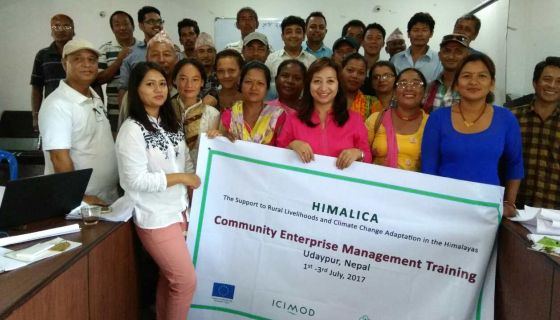This site uses cookies, as explained in our terms of use. If you consent, please close this message and continue to use this site.
Commercial vegetable farming has emerged as a viable livelihood option in Udayapur, Nepal. Vegetable farming was introduced to the district by the Support to Rural Livelihoods and Climate Change Adaptation in the Himalaya (Himalica) project of the International Centre for Integrated Mountain Development (ICIMOD) as part of its pilot project on developing climate-resilient vegetable value chains in the district. Over 450 households in the area now farm vegetables commercially. The Centre for Environmental and Agricultural Policy Research, Extension, and Development (CEAPRED) has been providing the necessary technical backup.
 Participants and instructors of the Community Enterprise Management Training organized by Himalica in Gaighat, Nepal
Image: Santosh Acharya
Participants and instructors of the Community Enterprise Management Training organized by Himalica in Gaighat, Nepal
Image: Santosh Acharya
ICIMOD and CEAPRED are helping three local farmers’ groups launch a common collection center and retail outlet under the Himalica brand. The produce is to be marketed as “fresh and healthy vegetables from the mountains”. The SAARC Business Association of Home Based Workers (SABAH) Nepal is providing business and marketing perspectives to the farmers.
Himalica organized a three-day training on community enterprise management from 1 to 3 July 2017 in Gaighat, Udayapur. The training addressed the need for building the business capacities of participating farmers. Twenty-four farmers (eight of whom were women) from the Bagaha, Saune and Murkuchi clusters, each with their own famers’ cooperative, participated in the training.
As part of the training, the participating farmers developed a comprehensive business model for community enterprise. This included a business plan and details of capital requirements as well as their understanding of the concept of a common facility centre. The training followed an earlier attempt by farmers from the three participating clusters to set up a retail store with the aim of gaining greater market shares. Without proper planning, they were unable to run their common collection centre and outlet and were forced to shut down after 21 days of operation.
At the training, the participants were taught to think like business people. They were introduced to important concepts such as strategic vision, market and marketing, leadership skills, business planning, operational models, cost of production, financial analysis, management, and community business enterprise. The farmers prepared individual pie charts depicting annual revenue streams from the sale of various vegetables. Distribution channels, the crucial four Ps (product, price, place, and promotion), and critical three Cs (customers, consumers, and competitors) were discussed to introduce participants to marketing mechanisms. By the end of the training, the participants were able to develop an annual financial plan for their enterprise.
The participants agreed on adopting a community facility centre (CFC) model and registering their community enterprise as the Himalica Agricultural Firm within the next month. They hope to reap the economies of scale and market at full scale under the Himalica brand by doing so. A management committee was formed with eight members, including three active women, representing all three clusters. The committee elected Bishnu Poudel their chairperson. A decision was taken to reopen the retail outlet and collection centre. Over 40 varieties of vegetables (potential products) were identified for cultivation by the community enterprise.
The farmers along with representatives from ICIMOD, SABAH Nepal, and CEAPRED also visited the Cottage and Small Industry Development Board (Ministry of Industry) to participate in a meeting with the Board’s Director, Nawaraj Raut. Twenty-two participating farmers agreed to contribute NPR 1,000 each as their shares in the new company and the outlet. The training was an eye opener for the participants as it helped restore their confidence and strengthened their commitment to pursue commercial vegetable production as well as marketing.

Lalita Chaudhary, a woman leader representing the Bagaha cluster on the Himalica Agricultural Firm management committee, receives NPR 22,000, equivalent to the shares of 22 farmers in the proposed firm
Image: Aleeza Karki
Stay up to date on what’s happening around the HKH with our most recent publications and find out how you can help by subscribing to our mailing list.
Sign Up